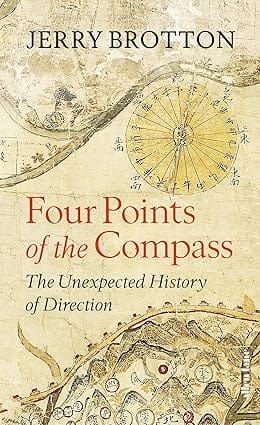- Contemporary Fiction
- Contemporary Fiction
- Children
- Children
- Comics & Graphic Novels
- Comics & Graphic Novels
- Non-Fiction
- Non-Fiction
- Fiction
- Fiction
A sparkling exploration of direction, by the acclaimed author of A History of the World in 12 Maps
North, south, east and west: almost all societies use the four cardinal directions to orientate themselves, to understand who they are by projecting where they are. For millennia, these four directions have been foundational to our travel, navigation and exploration and are central to the imaginative, moral and political geography of virtually every culture in the world. Yet they are far more subjective and various – sometimes contradictory – than we might realize.
The Four Points of the Compass takes the reader on a journey of directional discovery. Jerry Brotton reveals why Hebrew culture privileges east; why Renaissance Europeans began drawing north at the top of their maps; why the early Islam revered the south; why the Aztecs used five colour-coded cardinal directions; and why no societies, primitive or modern, have ever orientated themselves westwards. He ends by reflecting on our digital age in which we, the little blue dot on the screen, have become the most important compass point. Throughout, Brotton shows that the directions reflect a human desire to create order and that they only have meaning, literally and metaphorically, depending on where you stand.
Review
Surprising, entertaining and original -- Sathnam Sanghera, author of EMPIRELAND and EMPIREWORLD
Four Points of the Compass is breathless as well as breathtaking ... Brotton offers what might be framed as a history of the cultural politics of the cardinal directions [and] makes pertinent interventions in those politics ... fascinating titbits, provocations to thought and further inquiries abound ... -- Robert Mayhew - Times Literary Supplement
A unique and observant history ... well written, measured and precise ... points lucidly at where we have come from. -- Chris
Title Tba 328086 The Unexpected History Of Direction
SIZE GUIDE
- ISBN: 9780241556870
- Author: Jerry Brotton
- Publisher: Allen Lane
- Pages: 128
- Format: Hardback
Book Description
A sparkling exploration of direction, by the acclaimed author of A History of the World in 12 Maps
North, south, east and west: almost all societies use the four cardinal directions to orientate themselves, to understand who they are by projecting where they are. For millennia, these four directions have been foundational to our travel, navigation and exploration and are central to the imaginative, moral and political geography of virtually every culture in the world. Yet they are far more subjective and various – sometimes contradictory – than we might realize.
The Four Points of the Compass takes the reader on a journey of directional discovery. Jerry Brotton reveals why Hebrew culture privileges east; why Renaissance Europeans began drawing north at the top of their maps; why the early Islam revered the south; why the Aztecs used five colour-coded cardinal directions; and why no societies, primitive or modern, have ever orientated themselves westwards. He ends by reflecting on our digital age in which we, the little blue dot on the screen, have become the most important compass point. Throughout, Brotton shows that the directions reflect a human desire to create order and that they only have meaning, literally and metaphorically, depending on where you stand.
Review
Surprising, entertaining and original -- Sathnam Sanghera, author of EMPIRELAND and EMPIREWORLD
Four Points of the Compass is breathless as well as breathtaking ... Brotton offers what might be framed as a history of the cultural politics of the cardinal directions [and] makes pertinent interventions in those politics ... fascinating titbits, provocations to thought and further inquiries abound ... -- Robert Mayhew - Times Literary Supplement
A unique and observant history ... well written, measured and precise ... points lucidly at where we have come from. -- Chris
User reviews
NEWSLETTER
Subscribe to get Email Updates!
Thanks for subscribing.
Your response has been recorded.

India's Iconic & Independent Book Store offering a vast selection of books across a variety of genres Since 1978.
"We Believe In The Power of Books" Our mission is to make books accessible to everyone, and to cultivate a culture of reading and learning. We strive to provide a wide range of books, from classic literature, sci-fi and fantasy, to graphic novels, biographies and self-help books, so that everyone can find something to read.
Whether you’re looking for your next great read, a gift for someone special, or just browsing, Midland is here to make your book-buying experience easy and enjoyable.
We are shipping pan India and across the world.
For Bulk Order / Corporate Gifting
 +91 9818282497 |
+91 9818282497 |  [email protected]
[email protected]
Click To Know More
INFORMATION
ACCOUNT
QUICK LINKS
ADDRESS
Shop No.20, Aurobindo Palace Market, Near Church, New Delhi














